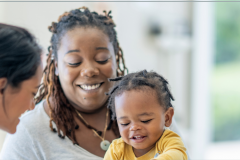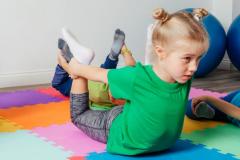- Overview
-
Moving evidence into action is vital to ensuring that children and their families have access to the safest, most effective health care innovations available. Dr. Glegg’s research examines the factors that enable and hinder evidence use in health care, and tests interventions to support the uptake of research and other forms of knowledge that can improve health services delivery.
Dr. Glegg’s research engages key stakeholders who benefit from or will be affected by the research, in order to ensure their perspectives, experience and expertise inform the work. Using mixed methods, her team explores the processes involved in knowledge translation and evidence informed practice at the individual, organizational, community, and health systems level across a range of settings. Her current work uses mixed methods, including surveys, interviews, focus groups, document review and social network analysis.
Social network analysis is a research approach that examines social processes. By mapping out the patterns of connections or interactions among people, organizations, or other entities, the social influences on different outcomes (e.g. evidence use) can be described and explained. Dr. Glegg uses this approach to study the use of evidence in organizations, communities and policy contexts to inform strategies to enhance the efficiency and effectiveness of knowledge translation efforts.
- Publications
-
Investigating Pediatricians’ Practice, Knowledge, and Barriers in Diagnosing Cerebral Palsy
Children
Wong, V. and Miller, S.D. and Scoten, O. and Cohen-Eilig, M. and Glegg, S. and Ip, A. and Jetha, C. and Mulpuri, K. and O?Donnell, M. and Mishaal, R.
DOI: 10.3390/children12091274
2025Developing a Knowledge Translation Intervention to Improve the Detection and Management of Pediatric Dyslipidemias in British Columbia
Cjc Pediatric and Congenital Heart Disease
Thorsen, V.K. and Glegg, S. and Harris, K.C.
DOI: 10.1016/j.cjcpc.2025.05.003
2025Gamification strategies that promote leisure participation in children and youth with disabilities
Disability and Rehabilitation Assistive Technology
Mahmoudi, E. and Movahed, M. and Majnemer, A. and Denner Dos Santos, C. and Backlin, G. and Siou, A. and Glegg, S. and Pritchard, L. and McCabe, J. and Shikako, K.
DOI: 10.1080/17483107.2025.2529508
2025Measuring family-important outcomes in large neonatal networks: where we are and where we need to go
Seminars in Perinatology
Demers, C. and Luu, T.M. and Glegg, S. and Afifi, J. and Pearce, R. and Thivierge, ?. and Janvier, A.
DOI: 10.1016/j.semperi.2025.152149
2025Capacity Building and Creating Supportive Environments for Inclusive Community-Based Participatory Research: A Case Study of the Overdose Prevention Peer Research Assistant (OPPRA) Project
International Journal of Qualitative Methods
Morgan, J. and Taylor, T. and Nolan, S. and Blais, A. and Cywink, S.L. and Duguay, J.M. and Gibbons, T.A. and Maxwell, S. and Marsh, S. and Pratt, M. and Glegg, S.
DOI: 10.1177/16094069251361077
2025Realist process evaluation of the knowledge translation programme of a patient-oriented research network
JOURNAL OF EVALUATION IN CLINICAL PRACTICE
DOI: 10.1111/JEP.14056
2024Innovations to the ECHO model to enhance reach and network-building among addiction clinicians in Western Canada
Addiction Science and Clinical Practice
Robinson, S. and Brohman, I. and Draanen, J.V. and Kushner, R. and Fairbairn, N. and Glegg, S.
DOI: 10.1186/s13722-024-00524-z
2024Community-Engaged Research Ethics Training (CERET): developing accessible and relevant research ethics training for community-based participatory research with people with lived and living experience using illicit drugs and harm reduction workers
HARM REDUCTION JOURNAL
DOI: 10.1186/S12954-023-00818-6
2023Connecting for Care: a protocol for a mixed-method social network analysis to advance knowledge translation in the field of child development and rehabilitation
IMPLEMENTATION SCIENCE COMMUNICATIONS
DOI: 10.1186/S43058-022-00372-5
2022The changing landscape of pharmaceutical alternatives to the unregulated drug supply during COVID-19
HARM REDUCTION JOURNAL
DOI: 10.1186/S12954-022-00657-X
2022"COVID just kind of opened a can of whoop-ass ": The rapid growth of safer supply prescribing during the pandemic documented through an environmental scan of addiction and harm reduction services in Canada
INTERNATIONAL JOURNAL OF DRUG POLICY
DOI: 10.1016/J.DRUGPO.2022.103742
2022Organizational supports for knowledge translation in paediatric health centres and research institutes: insights from a Canadian environmental scan
Implementation Science Communications
Stephanie Miranda Nadine Glegg and Andrea Ryce and Kimberly J. Miller and Laura Nimmon and Anita Kothari and Liisa Holsti
DOI: 10.1186/s43058-021-00152-7
12/2021Service delivery models for injectable opioid agonist treatment in Canada: 2 sequential environmental scans
CMAJ open
Eydt, E. and Glegg, S. and Sutherland, C. and Meador, K. and Trew, M. and Perreault, M. and Goyer, M. and Le Foll, B. and Turnbull, J. and Fairbairn, N.
DOI: 10.9778/cmajo.20200021
2021Editorial: Exploring Human-Computer Interactions in Virtual Performance and Learning in the Context of Rehabilitation
FRONTIERS IN VIRTUAL REALITY
DOI: 10.3389/FRVIR.2021.754020
2021Facilitating the Implementation of Virtual Reality-Based Therapies in Pediatric Rehabilitation
Physical & Occupational Therapy In Pediatrics
Priyanka Banerjee-Guénette and Sarah Bigford and Stephanie M. N. Glegg
DOI: 10.1080/01942638.2019.1650867
03/2020How the study of networks informs knowledge translation and implementation: a scoping review
Implementation Science
Stephanie M. N. Glegg and Emily Jenkins and Anita Kothari
DOI: 10.1186/s13012-019-0879-1
12/2019A comparison of virtual reality and active video game usage, attitudes and learning needs among therapists in Canada and the US
2019 International Conference on Virtual Rehabilitation (ICVR)
Danielle E. Levac and Stephanie Glegg and Sujata Pradhan and Emily J. Fox and Debbie Espy and Emily Chicklis and Judith E. Deutsch
DOI: 10.1109/icvr46560.2019.8994624
07/2019End-user involvement in rehabilitation virtual reality implementation research
Journal of Enabling Technologies
Rachel Proffitt and Stephanie Glegg and Danielle Levac and Belinda Lange
DOI: 10.1108/jet-10-2018-0050
06/2019Mixed methods study exploring parent engagement in child health research in British Columbia
BMJ Open
Jennifer Smith and Ian Pike and Mariana Brussoni and Lori Tucker and Louise M{\^{a}}sse and Janet W T Mah and Ainsley Boudreau and Dawn Mount and Russell Bonaguro and Stephanie Glegg and S Amed
DOI: 10.1136/bmjopen-2018-025404
05/2019A visual management tool for program planning, project management and evaluation in paediatric health care
Evaluation and Program Planning
Stephanie M.N. Glegg and Andrea Ryce and Kala Brownlee
DOI: 10.1016/j.evalprogplan.2018.09.005
02/2019Facilitating Interviews in Qualitative Research With Visual Tools: A Typology
Qualitative Health Research
Stephanie M. N. Glegg
DOI: 10.1177/1049732318786485
07/2018Barriers, Facilitators and Interventions to Support Virtual Reality Implementation in Rehabilitation: A Scoping Review
PM&R
DOI: 10.1016/J.PMRJ.2018.07.004
2018Application of Commercial Games for Home-Based Rehabilitation for People with Hemiparesis: Challenges and Lessons Learned
Games for Health Journal
Valdés, B.A. and Glegg, S.M.N. and Lambert-Shirzad, N. and Schneider, A.N. and Marr, J. and Bernard, R. and Lohse, K. and Hoens, A.M. and Van Der Loos, H.F.M.
DOI: 10.1089/g4h.2017.0137
2018Core knowledge translation competencies: a scoping review
Figshare
DOI: 10.6084/m9.figshare.c.4146662
2018Protocol of a scoping review on knowledge translation competencies
Systematic Reviews
Anastasia A. Mallidou and Pat Atherton and Liza Chan and Noreen Frisch and Stephanie Glegg and Gayle Scarrow
DOI: 10.1186/s13643-017-0481-z
05/2017Enhancing clinical implementation of virtual reality An evidence-based perspective and call to action
2017 INTERNATIONAL CONFERENCE ON VIRTUAL REHABILITATION (ICVR)
2017How do the perspectives of clinicians with and without virtual reality/active video game experience differ about its use in practice?
Virtual Reality Recent Advances for Health and Wellbeing
Levac, D.E. and Miller, P. and Glegg, S.M.N. and Colquhoun, H.
2017Evaluating change in virtual reality adoption for brain injury rehabilitation following knowledge translation
Disability and Rehabilitation: Assistive Technology
Glegg, S.M.N. and Holsti, L. and Stanton, S. and Hanna, S. and Velikonja, D. and Ansley, B. and Sartor, D. and Brum, C.
DOI: 10.3109/17483107.2015.1111944
2017Virtual Rehabilitation with Children: Challenges for Clinical Adoption [From the Field]
IEEE Pulse
Glegg, S.
DOI: 10.1109/MPUL.2017.2750858
2017Virtual Reality and Active Videogame-Based Practice, Learning Needs, and Preferences: A Cross-Canada Survey of Physical Therapists and Occupational Therapists
Games for Health Journal
Levac, D. and Glegg, S. and Colquhoun, H. and Miller, P. and Noubary, F.
DOI: 10.1089/g4h.2016.0089
2017Making conferences matter: A post-conference knowledge translation strategy,Augmenter l’impact des congrès grâce à une stratégie d’application des connaissances après les congrès
Occupational Therapy Now
Glegg, S.
2017Enhancing clinical implementation of virtual reality
International Conference on Virtual Rehabilitation, ICVR
Glegg, S.M.N. and Levac, D.E.
DOI: 10.1109/ICVR.2017.8007488
2017Advancing Health and Inclusion
The University of British Columbia
DOI: 10.14288/1.0348241
2017Trunk Compensation During Bimanual Reaching at Different Heights by Healthy and Hemiparetic Adults
Journal of Motor Behavior
Valdés, B.A. and Glegg, S.M.N. and Van der Loos, H.F.M.
DOI: 10.1080/00222895.2016.1241748
2017Role Domains of Knowledge Brokering
Journal of Neurologic Physical Therapy
Stephanie M. Glegg and Alison Hoens
DOI: 10.1097/npt.0000000000000122
04/2016A knowledge translation intervention to enhance clinical application of a virtual reality system in stroke rehabilitation
Figshare
DOI: 10.6084/m9.figshare.c.3615422
2016Promoting therapists' use of motor learning strategies within virtual reality-based stroke rehabilitation
PLoS ONE
Levac, D.E. and Glegg, S.M.N. and Sveistrup, H. and Colquhoun, H. and Miller, P. and Finestone, H. and De Paul, V. and Harris, J.E. and Velikonja, D.
DOI: 10.1371/journal.pone.0168311
2016Facilitating interprofessional evidence-based practice in paediatric rehabilitation: Development, implementation and evaluation of an online toolkit for health professionals
Disability and Rehabilitation
Glegg, S.M.N. and Livingstone, R. and Montgomery, I.
DOI: 10.3109/09638288.2015.1041616
2016Best practice recommendations for the development, implementation, and evaluation of online knowledge translation resources in rehabilitation.
Levac D and Glegg SM and Camden C and Rivard LM and Missiuna C
DOI: 10.2522/ptj.20130500
PubMed: 25301966
04/2015Visualisation of two-dimensional kinematic data from bimanual control of a commercial gaming system used in post-stroke rehabilitation
The University of British Columbia
DOI: 10.14288/1.0075867
2015Kinecting the moves: The kinematic potential of rehabilitation-specific gaming to inform treatment for hemiparesis
Technology, Rehabilitation and Empowerment of People with Special Needs
Glegg, S.M. and Hung, C.T. and Valdés Benavides, B.A. and Kim, B.D. and Van der Loos, H.M.
2015The Reality of Virtual Reality In Stroke Rehabilitation
Archives of Physical Medicine and Rehabilitation
Jocelyn Harris and Heidi Sveistrup and Stephanie M N Glegg and Heather Colquhoun and Hillel Finestone and Pat Miller and Vincent DePaul and Laurie Wishart and Marie Brien
DOI: 10.1016/j.apmr.2014.07.030
10/2014The GestureTek virtual reality system in rehabilitation: a scoping review.
Glegg SM and Tatla SK and Holsti L
DOI: 10.3109/17483107.2013.799236
PubMed: 23713408
03/2014Evaluating change in virtual reality adoption for brain injury rehabilitation: A knowledge translation study
BRAIN INJURY
2014Using virtual reality in clinical practice: A multi-site exploratory study.
Glegg SM and Holsti L and Stanton S and Hanna S and Velikonja D and Ansley B and Sartor D and Brum C
DOI: 10.3233/NRE-141152
PubMed: 25238866
2014Kinecting the moves: the kinematic potential of rehabilitation-specific gaming to inform treatment for hemiplegia
The University of British Columbia
DOI: 10.14288/1.0075871
2014Integrating Motor Learning and Virtual Reality Into Practice: a Knowledge Translation Challenge
STROKE
2014Supporting therapists to integrate virtual reality systems within clinical practice: A knowledge translation study
2013 International Conference on Virtual Rehabilitation (ICVR)
Danielle Levac and Heidi Sveistrup and Stephanie Glegg and Patricia Miller and Heather Colquhoun
DOI: 10.1109/icvr.2013.6662107
08/2013Factors influencing therapists' adoption of virtual reality for brain injury rehabilitation.
Glegg SM and Holsti L and Velikonja D and Ansley B and Brum C and Sartor D
DOI: 10.1089/cyber.2013.1506
PubMed: 23713844
05/2013Virtual reality for brain injury rehabilitation : an evaluation of clinical practice, therapists' adoption and knowledge translation
University of British Columbia
DOI: 10.14288/1.0073087
2012Measures of knowledge and skills for evidence-based practice: a systematic review.
Glegg SM and Holsti L
DOI: 10.2182/cjot.2010.77.4.4
PubMed: 21090063
10/2010Knowledge brokering as an intervention in paediatric rehabilitation practice
INTERNATIONAL JOURNAL OF THERAPY AND REHABILITATION
DOI: 10.12968/IJTR.2010.17.4.47314
2010 - Research
-
Virtual reality adoption for rehabilitation
Dr. Glegg co-leads national surveys on the barriers and facilitators of virtual reality technologies for health care in Canada and the United States, as well as engaging in collaborations to replicate these studies in the United Kingdom and Spain. These surveys use a theory-based measure, the Assessing Determinants of Prospective Take-up of Virtual Reality (ADOPT-VR, version 2) Instrument developed by Dr. Glegg to evaluate the factors influencing VR and active video game implementation for physical and cognitive rehabilitation. The instrument has been used in over 14 studies worldwide, including VR implementation research by Dr. Glegg and her team within paediatric rehabilitation centres in Canada.Implementing an evidence informed coaching approach into community-based physical activity programs for children with neurodevelopmental conditions
Children with neurodevelopmental conditions experience greater exclusion, social isolation and sedentary activities than their typically developing peers. Physical activity programs can improve self-esteem, social integration, mental health, quality of life and daily functioning for children. Impacts for families include enhanced social support, mental health, and reslience. Kids Action Coaching is an evidence-based coaching approach that includes personalized, child-centered coaching, family-engaged home-based activities, and social networking opportunities for families. Our team’s initial work involved the implementation of this coaching approach through a partnership with Special Olympics BC and other local physical activity programs in urban centres in BC. Our current work with funding from the BC Ministry of Health and the Michael Smith Foundation for Health Research has allowed us to expand implementation to rural, remote and Indigenous communities across BC. Work is underway for a national scale-up with funding support from Kids Brain Health Network. This project will contribute to more inclusive and equitable participation in physical recreation for children with neurodevelopmental conditions across Canada that is optimized to improve physical and mental health outcomes for these children and their families.Child-Sized KT: Development of a family portal to support family engagement in child health research
Child-Sized KT is a stakeholder-engaged project that aims to foster family and health professional partnerships in research to improve the relevance, quality and collaboration in child health research. This online platform is designed to provide opportunities for children and families to connect with researchers, to contribute to the design, conduct and implementation of research that is aligned with their interests, and to learn about the findings of innovative work in this field. The platform includes a family portal that uses gamification and animated stories of families’ real--life experiences engaging in research. This resource helps people who are new to research to understand the research process and what is involved in taking part in research, and to link with existing or planned research projects. This work has been made possible by funding from CIHR, the UBC Faculty of Medicine, and the CHILD-BRIGHT SPOR Network. Future phases will integrate the platform with a child health research project database, and portals for researchers and for clinicians.Grants2020-2023: Kids Brain Health Network, $200,000. Role: Co-Principal Investigator; Principal Investigator: Jean-Paul Collet. Project: National scale-up of the New-PAC physical activity coaching program to support children with neurodevelopmental disabilities.
2019-2022: Michael Smith Foundation for Health Research Implementation Science Team Project Grant, $500,000. Role: Co-Research Lead; Principal Investigator: Lise Olsen. Project: Implementing physical activity programs in communities for children with neuro-disabilities.
2019-2022: British Columbia Ministry of Health, $436,803. Role: Principal Investigator: Jean-Paul Collet. Project: Implementing physical activity programs in Indigenous rural and remote communities for children with neurodevelopmental disabilities.
2018-2019: Michael Smith Foundation for Health Research Implementation Science Team Development Grant, $20,000 (matched funds by KBHN). Role: Researcher Co-Lead; Principal Investigator: William McKellin. Project: Implementing physical activity programs in communities for children with neurodisabilities.
2018-2020: BC SUPPORT Unit Methods Cluster Project Grant, $85,650. Role: Co-Applicant; Principal Applicant: Sarah Munro. Project: Using documentary as a method of knowledge translation to reach the “Sandwich Generation.”
2018-2020: Kids Brain Health Network, $199,150. Role: Co-Principal Investigator; Principal Investigator: Jean-Paul Collet. Project: Knowledge translation to support evidence-informed physical activity program coaching for children with neurodevelopmental disabilities.
2018-2019: CHILD-BRIGHT Knowledge Translation Innovation Incubator Grant, $20,000. Role: Co-Principal Investigator; Principal Investigator: Shazhan Amed. Project: Child-Sized KT: An online portal for family engagement in child health research.
2018-2019: UBC Faculty of Medicine Strategic Investment Fund, $60,600. Role: Co-Investigator; Principal Investigator: Shazhan Amed. Project: Child-Sized KT: Development of a digital strategy for an online child health research engagement platform for patients and families.
2017-2018: Michael Smith Foundation for Health Research REACH Award, $10,000. Role: Trainee co-applicant; Principal Investigator: Jill Zwicker. Project: The DCD Advocacy Toolkit: Supporting diagnosis and intervention for children with developmental coordination disorder in British Columbia.
2016-2019: CHILD-BRIGHT Strategy for Patient Oriented Research (SPOR) Initiative, $625,662. Role: Co-Investigator; Principal Investigator: Keiko Shikako-Thomas. Project: Jooay: User experience and effectiveness of a mobile App designed to increase leisure participation in adolescents with disabilities.
2016-2021: CIHR Foundation Scheme - Live Pilot, $684,199. Role: Co-Knowledge User; Principal Investigator: Jill Zwicker. Project: Using brain mapping to examine predictors of developmental coordination disorder and response to intervention.
2025-2027: Kids Brain Health Network/Brain Canada & Michaels Smith Health Research BC, $400,000. Role: Principal Investigator.
Honours & Awards2020: CPDD Travel Award for Early Career Investigators, $1200. College on Problems of Drug Dependence, to present at Annual Scientific Meeting.
2019-2022: CIHR Fellowship, $150,000. CIHR, ranked 2nd of 105 applicants in the national competition.
2018: Best Paper Award, $250 USD. International Conference on Disability, Virtual Reality and Associated Technologies.
2018: Kids Brain Health Network Lab Exchange Award, $1000. Kids Brain Health Network (KBHN), for career development in brain health research.
2016-2019: Vanier Canada Graduate Scholarship, $150,000. CIHR, for scholarly achievement and demonstrated leadership.
2016-2019: Canadian Child Health Clinician Scientist Program Career Enhancement Award. CCHCSP, for child health clinician researchers training to be clinician scientists.
2016-2019: UBC Public Scholars Award, $12,000. UBC, for innovative, collaborative scholarship that contributes to the public interest.
2016-2020: Four Year Fellowship, $96,725. UBC, for academic achievement.
2016: CIHR Doctoral Award, $105,000 (declined to accept Vanier Scholarship). CIHR, ranked 2nd of 432 applicants in the national competition.
2016: Child & Family Research Institute Graduate Studentship, $40,000 (declined to accept Vanier Scholarship).
2015-2016: Faculty of Medicine Graduate Award, $14,000. UBC, for outstanding academic and research excellence, and personal characteristics.
2015-2016: Rehabilitation Sciences Doctoral Scholarship, $40,000. UBC, for top student in Rehabilitation Sciences PhD program.
2015: Best Student Paper, $200 USD. International Conference on Virtual Rehabilitation.
2014: Best Short Paper, $200 USD. International Conference on Disability, Virtual Reality and Associated Technologies.
2012: David W. Strangway Affiliated Fellowship, $5333. UBC, for academic excellence.
2011: Frederick Banting & Charles Best Canada Graduate Scholarship Master's Award, $17,500. CIHR, for outstanding students pursuing master’s studies in health sciences.
2009: Graduate Entrance Scholarship, $6199. UBC, for the top MSc student entering the Rehabilitation Sciences graduate program.
2008: Excellence in Education Award. Children’s & Women’s (C&W) Health Centre of BC, for the development of clinical protocols for virtual rehabilitation.
2008: Excellence in Education Award, Honourable Mention. C&W Health Centre of BC, for mentoring/clinical teaching.
2004: Brock Fahrni Prize in Occupational Therapy, $130. UBC, for head of the graduating class in Rehabilitation Sciences.
Research Group MembersGillian Backlin, Research Assistant
Allison Chiu, Patient Safety Lead, Child Health BC
Leslie Farrar, Masters Trainee
Morgan Flynn, Work Learn Student/Research Assistant
Emma Haight, Summer Studentship Research Assistant
Elise Hugens, Work Learn Student
Zoe Pagonis, Graduate research trainee
Sophie Sajjadi, Research Assistant
Anton Santos, Research Assistant:Masters student
Yvette Sin, Volunteer
Genevieve Sutherns, Research Assistant
Matthew Thacker, Regional Coordinator, Child Health BC
Vivian Wong, Graduate Academic Assistant
Research Roundup: January 2022
This month’s Research Roundup covers how increasing parent-child proximity in the first days of life can improve toddler behaviour later on, what lean body mass can tell us about the health of pediatric kidney transplant recipients, insights into the barriers to knowledge translation in Canadian pediatric health-care centres, and an evaluation of the effectiveness of saline gargle COVID-19 tests.






